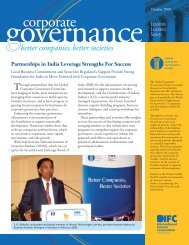A Self-Assessment Guide for Health Care Organizations - IFC
A Self-Assessment Guide for Health Care Organizations - IFC
A Self-Assessment Guide for Health Care Organizations - IFC
Create successful ePaper yourself
Turn your PDF publications into a flip-book with our unique Google optimized e-Paper software.
emergency<br />
1. An unanticipated or sudden occasion, as in emergency surgery<br />
needed to prevent death or serious disability.<br />
2. A natural or man-made event that significantly disrupts the<br />
environment of care (<strong>for</strong> example, damage to the organization’s<br />
building(s) and grounds due to severe winds, storms, or<br />
earthquakes); that significantly disrupts care and treatment (<strong>for</strong><br />
example, loss of utilities such as power, water, or telephones<br />
due to floods, civil disturbances, accidents, or emergencies in<br />
the organization or its community); or that results in sudden,<br />
significantly changed or increased demands <strong>for</strong> the organization’s<br />
services (<strong>for</strong> example, bioterrorist attack, building collapse, or<br />
plane crash in the organization’s community). Some severe<br />
emergencies are called “disasters”.<br />
ethical<br />
Con<strong>for</strong>ming to accepted standards of moral, social or professional<br />
behavior.<br />
governance<br />
The individual(s), group, or agency that has ultimate authority and<br />
responsibility <strong>for</strong> establishing policy, maintaining quality of care,<br />
and providing <strong>for</strong> organization management and planning. Other<br />
names <strong>for</strong> this group include “board,” “board of trustees,” “board<br />
of governors,” “board of commissioners,” and “governing body.”<br />
harvesting, of organs<br />
Removal of an organ <strong>for</strong> means of transplantation.<br />
hazardous materials and waste<br />
Materials whose handling, use, and storage are guided or defined<br />
by local, regional, or national regulation, hazardous vapors, and<br />
hazardous energy sources. Although JCI considers infectious waste<br />
as falling into this category of materials, not all laws and regulations<br />
define infectious or medical waste as hazardous waste.<br />
health care–associated infection(s) (HAI)<br />
Also known as nosocomial infections. Any infection(s) acquired<br />
by an individual while receiving care or services in a health care<br />
organization. Common HAIs are urinary infections, surgical<br />
wound infections, pneumonia, and blood stream infections.<br />
health care professional<br />
Any person who has completed a course of study and is skilled in<br />
a field of health. This includes a physician, dentist, nurse, or allied<br />
health professional. <strong>Health</strong> care professionals are often licensed by<br />
a government agency or certified by a professional organization.<br />
IDA<br />
The International Development Association is the part of the<br />
World Bank that helps the world’s poorest countries. Established<br />
in 1960, IDA aims to reduce poverty by providing interest-free<br />
credits and grants <strong>for</strong> programs that boost economic growth,<br />
reduce inequalities and improve people’s living conditions.<br />
indicator<br />
A measure used to determine, over time, an organization’s<br />
per<strong>for</strong>mance of functions, processes, and outcomes.<br />
infectious waste<br />
See hazardous materials and waste<br />
in<strong>for</strong>med consent<br />
Agreement or permission accompanied by full in<strong>for</strong>mation on the<br />
nature, risks, and alternatives of a medical procedure or treatment<br />
be<strong>for</strong>e the physician or other health care professional begins the<br />
procedure or treatment. After receiving this in<strong>for</strong>mation, the<br />
patient then either consents to or refuses such a procedure or<br />
treatment.<br />
in-service education<br />
Organized education, usually provided in the workplace, designed<br />
to enhance the skills of staff members or teach them new skills<br />
relevant to their jobs and disciplines.<br />
inpatient<br />
Generally, persons who are admitted to and housed in a health care<br />
organization at least overnight.<br />
intent statement<br />
A brief explanation of a standard’s rationale, meaning, and<br />
significance, noted in this manual under the heading Intent. Intent<br />
statements may contain detailed expectations of the standard that<br />
are evaluated in the on-site survey process.<br />
invasive procedure<br />
A procedure involving puncture or incision of the skin, or insertion<br />
of an instrument or <strong>for</strong>eign material into the body.<br />
job description<br />
Explanation of an employment position including duties,<br />
responsibilities, and conditions required to per<strong>for</strong>m the job.<br />
<strong>IFC</strong> <strong>Self</strong>-<strong>Assessment</strong> <strong>Guide</strong> <strong>for</strong> <strong>Health</strong> <strong>Care</strong> <strong>Organizations</strong> 95



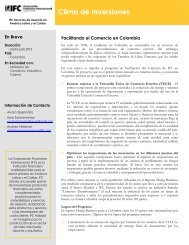
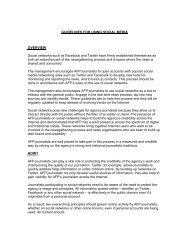
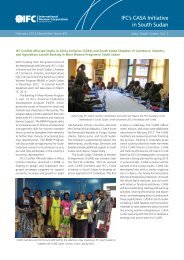
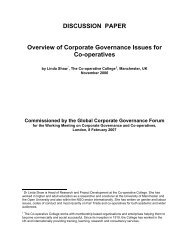
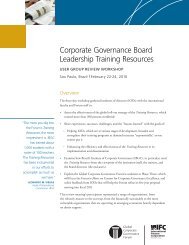

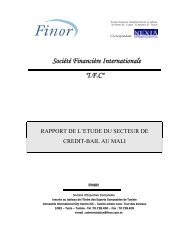
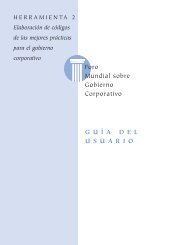

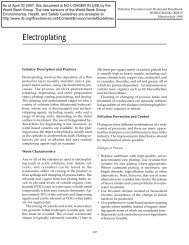

![Print a two-page fact sheet on this project [PDF] - IFC](https://img.yumpu.com/43449799/1/190x245/print-a-two-page-fact-sheet-on-this-project-pdf-ifc.jpg?quality=85)

